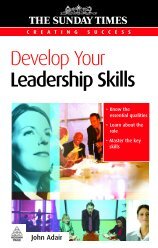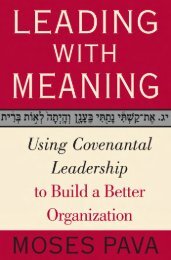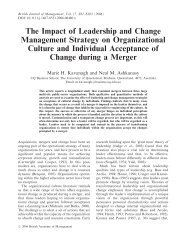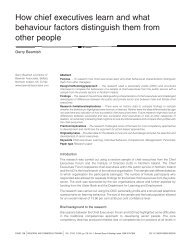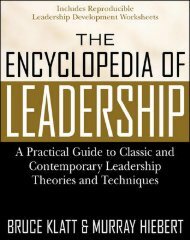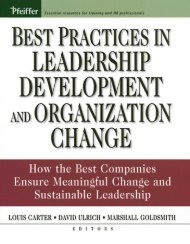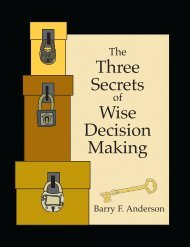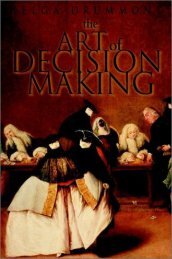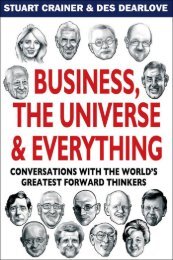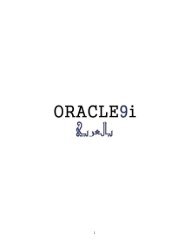- Page 2 and 3:
Decision Analysis for Management Ju
- Page 5 and 6:
Decision Analysis for Management Ju
- Page 7:
To Mary and Josephine, Jamie, Jerom
- Page 10 and 11:
viii Contents Chapter 16 The analyt
- Page 12 and 13:
x Foreword real problems, and it is
- Page 14 and 15:
xii Preface accountancy, where rece
- Page 17 and 18:
1 Introduction Complex decisions Im
- Page 19 and 20:
The role of decision analysis 3 you
- Page 21 and 22:
Applications of decision analysis 5
- Page 23 and 24:
Applications of decision analysis 7
- Page 25 and 26:
Applications of decision analysis 9
- Page 27 and 28:
Overview of the book 11 and profit.
- Page 29:
References 13 8. Walls, M. R., Mora
- Page 32 and 33:
16 How people make decisions involv
- Page 34 and 35:
18 How people make decisions involv
- Page 36 and 37:
20 How people make decisions involv
- Page 38 and 39:
22 How people make decisions involv
- Page 40 and 41:
24 How people make decisions involv
- Page 42 and 43:
26 How people make decisions involv
- Page 44 and 45:
28 Decisions involving multiple obj
- Page 46 and 47:
30 Decisions involving multiple obj
- Page 48 and 49:
32 Decisions involving multiple obj
- Page 50 and 51:
34 Decisions involving multiple obj
- Page 52 and 53:
36 Decisions involving multiple obj
- Page 54 and 55:
38 Decisions involving multiple obj
- Page 56 and 57:
40 Decisions involving multiple obj
- Page 58 and 59:
42 Decisions involving multiple obj
- Page 60 and 61:
44 Decisions involving multiple obj
- Page 62 and 63:
46 Decisions involving multiple obj
- Page 64 and 65:
48 Decisions involving multiple obj
- Page 66 and 67:
50 Decisions involving multiple obj
- Page 68 and 69:
52 Decisions involving multiple obj
- Page 70 and 71:
54 Decisions involving multiple obj
- Page 72 and 73:
56 Decisions involving multiple obj
- Page 74 and 75:
58 Decisions involving multiple obj
- Page 76 and 77:
60 Decisions involving multiple obj
- Page 78 and 79:
62 Decisions involving multiple obj
- Page 80 and 81:
64 Decisions involving multiple obj
- Page 82 and 83:
66 Decisions involving multiple obj
- Page 84 and 85:
68 Decisions involving multiple obj
- Page 86 and 87:
70 Decisions involving multiple obj
- Page 88 and 89:
72 Introduction to probability Beca
- Page 90 and 91:
74 Introduction to probability prac
- Page 92 and 93:
76 Introduction to probability we w
- Page 94 and 95:
78 Introduction to probability whet
- Page 96 and 97:
80 Introduction to probability give
- Page 98 and 99:
82 Introduction to probability prob
- Page 100 and 101:
84 Introduction to probability deci
- Page 102 and 103:
86 Introduction to probability that
- Page 104 and 105:
88 Introduction to probability inte
- Page 106 and 107:
90 Introduction to probability subj
- Page 108 and 109:
92 Introduction to probability (5)
- Page 110 and 111:
94 Introduction to probability (a)
- Page 112 and 113:
96 Decision making under uncertaint
- Page 114 and 115:
98 Decision making under uncertaint
- Page 116 and 117:
100 Decision making under uncertain
- Page 118 and 119:
102 Decision making under uncertain
- Page 120 and 121:
104 Decision making under uncertain
- Page 122 and 123:
106 Decision making under uncertain
- Page 124 and 125:
108 Decision making under uncertain
- Page 126 and 127:
110 Decision making under uncertain
- Page 128 and 129:
112 Decision making under uncertain
- Page 130 and 131:
114 Decision making under uncertain
- Page 132 and 133:
116 Decision making under uncertain
- Page 134 and 135:
118 Decision making under uncertain
- Page 136 and 137:
120 Decision making under uncertain
- Page 138 and 139:
122 Decision making under uncertain
- Page 140 and 141:
124 Decision making under uncertain
- Page 142 and 143:
126 Decision making under uncertain
- Page 144 and 145:
128 Decision making under uncertain
- Page 146 and 147:
130 Decision making under uncertain
- Page 148 and 149:
132 Decision making under uncertain
- Page 150 and 151:
134 Decision making under uncertain
- Page 152 and 153:
136 Decision making under uncertain
- Page 154 and 155:
138 Decision making under uncertain
- Page 156 and 157:
140 Decision making under uncertain
- Page 159 and 160:
6 Decision trees and influence diag
- Page 161 and 162:
Constructing a decision tree 145 be
- Page 163 and 164:
Determining the optimal policy 147
- Page 165 and 166:
Decision trees and utility 149 succ
- Page 167 and 168:
Decision trees involving continuous
- Page 169 and 170:
Practical applications of decision
- Page 171 and 172:
Assessment of decision structure 15
- Page 173 and 174:
Assessment of decision structure 15
- Page 175 and 176:
Eliciting decision tree representat
- Page 177 and 178:
Eliciting decision tree representat
- Page 179 and 180: Summary 163 where the resulting dec
- Page 181 and 182: Exercises 165 other elements of the
- Page 183 and 184: Exercises 167 (b) Assuming that Wes
- Page 185 and 186: Exercises 169 is not hired, given t
- Page 187 and 188: Exercises 171 failing to meet the p
- Page 189 and 190: Exercises 173 why it was rational f
- Page 191 and 192: Exercises 175 (11) In the Eagle Mou
- Page 193 and 194: References 177 ABC Chemicals are pl
- Page 195 and 196: 7 Applying simulation to decision p
- Page 197 and 198: Monte Carlo simulation 181 Of cours
- Page 199 and 200: Monte Carlo simulation 183 Table 7.
- Page 201 and 202: Applying simulation to a decision p
- Page 203 and 204: Applying simulation to a decision p
- Page 205 and 206: Applying simulation to a decision p
- Page 207 and 208: Applying simulation to a decision p
- Page 209 and 210: Applying simulation to a decision p
- Page 211 and 212: Applying simulation to a decision p
- Page 213 and 214: Applying simulation to investment d
- Page 215 and 216: Applying simulation to investment d
- Page 217 and 218: Applying simulation to investment d
- Page 219 and 220: Applying simulation to investment d
- Page 221 and 222: Summary 205 Hull 10 ), some of them
- Page 223 and 224: Exercises 207 (c) Use your simulati
- Page 225 and 226: Exercises 209 For each factor the f
- Page 227 and 228: Exercises 211 (b) Suppose that your
- Page 229: References 213 6 million Therefore
- Page 233 and 234: Bayes’ theorem 217 1000 component
- Page 235 and 236: Bayes’ theorem 219 probability th
- Page 237 and 238: The effect of new information 221 E
- Page 239 and 240: The effect of new information 223 P
- Page 241 and 242: Assessing the value of new informat
- Page 243 and 244: Assessing the value of new informat
- Page 245 and 246: Assessing the value of new informat
- Page 247 and 248: Assessing the value of new informat
- Page 249 and 250: Assessing the value of new informat
- Page 251 and 252: Practical considerations 235 inform
- Page 253 and 254: Exercises 237 the reliability of th
- Page 255 and 256: Exercises 239 (a) The company’s m
- Page 257 and 258: Exercises 241 (8) The managers of R
- Page 259 and 260: Exercises 243 bill of $6000 for any
- Page 261: References 245 are favorable or unf
- Page 264 and 265: 248 Biases in probability assessmen
- Page 266 and 267: 250 Biases in probability assessmen
- Page 268 and 269: 252 Biases in probability assessmen
- Page 270 and 271: 254 Biases in probability assessmen
- Page 272 and 273: 256 Biases in probability assessmen
- Page 274 and 275: 258 Biases in probability assessmen
- Page 276 and 277: 260 Biases in probability assessmen
- Page 278 and 279: 262 Biases in probability assessmen
- Page 280 and 281:
264 Biases in probability assessmen
- Page 282 and 283:
266 Biases in probability assessmen
- Page 284 and 285:
268 Biases in probability assessmen
- Page 286 and 287:
270 Biases in probability assessmen
- Page 288 and 289:
272 Biases in probability assessmen
- Page 290 and 291:
274 Biases in probability assessmen
- Page 292 and 293:
276 Biases in probability assessmen
- Page 294 and 295:
278 Methods for eliciting probabili
- Page 296 and 297:
280 Methods for eliciting probabili
- Page 298 and 299:
282 Methods for eliciting probabili
- Page 300 and 301:
284 Methods for eliciting probabili
- Page 302 and 303:
286 Methods for eliciting probabili
- Page 304 and 305:
288 Methods for eliciting probabili
- Page 306 and 307:
290 Methods for eliciting probabili
- Page 308 and 309:
292 Methods for eliciting probabili
- Page 310 and 311:
294 Methods for eliciting probabili
- Page 313 and 314:
11 Risk and uncertainty management
- Page 315 and 316:
The Two Valleys Company 299 Fixed c
- Page 317 and 318:
The Two Valleys Company 301 annual
- Page 319 and 320:
The Two Valleys Company 303 Demand
- Page 321 and 322:
Summary 305 Table 11.3 - Ideas for
- Page 323 and 324:
Exercise 307 (a) The percentage of
- Page 325 and 326:
12 Decisions involving groups of in
- Page 327 and 328:
Aggregating judgments in general 31
- Page 329 and 330:
Aggregating judgments in general 31
- Page 331 and 332:
Aggregating preference judgments 31
- Page 333 and 334:
Aggregating preference judgments 31
- Page 335 and 336:
Aggregating preference judgments 31
- Page 337 and 338:
Structured group processes 321 said
- Page 339 and 340:
Decision conferencing 323 In contra
- Page 341 and 342:
Summary 325 virtually all real-worl
- Page 343 and 344:
References 327 Mean score Stay at B
- Page 345 and 346:
13 Resource allocation and negotiat
- Page 347 and 348:
The main stages of the analysis 331
- Page 349 and 350:
The main stages of the analysis 333
- Page 351 and 352:
The main stages of the analysis 335
- Page 353 and 354:
The main stages of the analysis 337
- Page 355 and 356:
The main stages of the analysis 339
- Page 357 and 358:
The main stages of the analysis 341
- Page 359 and 360:
The main stages of the analysis 343
- Page 361 and 362:
An illustrative problem 345 weekly
- Page 363 and 364:
An illustrative problem 347 Table 1
- Page 365 and 366:
Summary 349 Practical applications
- Page 367 and 368:
Discussion questions 351 Table 13.4
- Page 369:
References 353 References 1. Philli
- Page 372 and 373:
356 Decision framing and cognitive
- Page 374 and 375:
358 Decision framing and cognitive
- Page 376 and 377:
360 Decision framing and cognitive
- Page 378 and 379:
362 Decision framing and cognitive
- Page 380 and 381:
364 Decision framing and cognitive
- Page 382 and 383:
366 Decision framing and cognitive
- Page 384 and 385:
368 Decision framing and cognitive
- Page 386 and 387:
370 Decision framing and cognitive
- Page 388 and 389:
372 Decision framing and cognitive
- Page 390 and 391:
14 Appendix Figure 14.6 - Solution
- Page 392 and 393:
376 Decision framing and cognitive
- Page 394 and 395:
378 Scenario planning pressures. Th
- Page 396 and 397:
380 Scenario planning in, say, 10 y
- Page 398 and 399:
382 Scenario planning Positive Scen
- Page 400 and 401:
384 Scenario planning Provide high-
- Page 402 and 403:
386 Scenario planning ‘PLENTY FOR
- Page 404 and 405:
388 Scenario planning Is a Current
- Page 406 and 407:
390 Scenario planning But after a y
- Page 408 and 409:
392 Scenario planning low power hig
- Page 410 and 411:
394 Scenario planning Internet-faci
- Page 412 and 413:
396 Scenario planning collectivism
- Page 414 and 415:
398 Scenario planning government. E
- Page 416 and 417:
400 Scenario planning are determine
- Page 418 and 419:
402 Scenario planning against multi
- Page 420 and 421:
404 Scenario planning Scenario 1: (
- Page 422 and 423:
406 Scenario planning These scores
- Page 424 and 425:
408 Scenario planning Objective Wei
- Page 426 and 427:
410 Scenario planning process of an
- Page 429 and 430:
16 Introduction The analytic hierar
- Page 431 and 432:
Making pairwise comparisons of attr
- Page 433 and 434:
Obtaining weights and checking cons
- Page 435 and 436:
Sensitivity analysis 419 erroneous
- Page 437 and 438:
Strengths and criticisms of the AHP
- Page 439 and 440:
Exercises 423 Conclusion The AHP is
- Page 441:
References 425 8. Belton, V. and St
- Page 444 and 445:
428 Alternative decision-support sy
- Page 446 and 447:
430 Alternative decision-support sy
- Page 448 and 449:
432 Alternative decision-support sy
- Page 450 and 451:
434 Alternative decision-support sy
- Page 452 and 453:
436 Alternative decision-support sy
- Page 454 and 455:
438 Alternative decision-support sy
- Page 456 and 457:
440 Alternative decision-support sy
- Page 458 and 459:
442 Alternative decision-support sy
- Page 460 and 461:
444 Alternative decision-support sy
- Page 462 and 463:
446 Alternative decision-support sy
- Page 464 and 465:
448 Alternative decision-support sy
- Page 466 and 467:
450 Alternative decision-support sy
- Page 468 and 469:
452 Alternative decision-support sy
- Page 470 and 471:
454 Alternative decision-support sy
- Page 472 and 473:
456 Alternative decision-support sy
- Page 474 and 475:
458 Alternative decision-support sy
- Page 476 and 477:
460 Alternative decision-support sy
- Page 478 and 479:
462 Alternative decision-support sy
- Page 480 and 481:
464 Suggested answers to selected q
- Page 482 and 483:
466 Suggested answers to selected q
- Page 484 and 485:
468 Suggested answers to selected q
- Page 487 and 488:
Index @RISK 205 across-criteria wei
- Page 489 and 490:
Index 473 distinctive competencies
- Page 491 and 492:
Index 475 net present value (NPV) m
- Page 493:
Index 477 utility functions 7, 102



